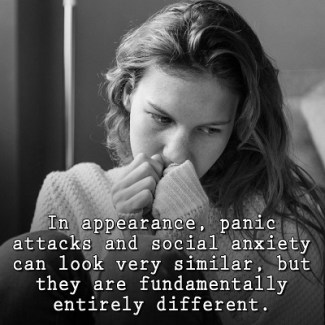Social Anxiety
 Are you one of the millions who are fearful of social interaction? Do you feel subconscious and judged by others when you are in a social situation?
Are you one of the millions who are fearful of social interaction? Do you feel subconscious and judged by others when you are in a social situation?
You might even avoid meeting new people and prefer to stay in your little corner of the world, where it’s safe.
If any of these ring true for you and you’ve felt this way for six months or more, you may have a social anxiety disorder.
Once upon a time social anxiety was more commonly called social phobia, and yes, it is an actual mental health diagnosis, according to the Diagnostic and Statistical Manual of Mental Disorders.
In the simplest of terms, social anxiety occurs when someone seems to be irrationally anxious when in social situations and the anxiety disappears when they are alone. Let’s look briefly at the causes, symptoms and treatments for social anxiety: Continue reading
 To pinpoint one specific cause of social anxiety is like trying to find a needle in a haystack. Social anxiety disorder has only been a viable mental health diagnosis since the 80s according to the Diagnostic Statistics Manual (DSM). The criteria have changed minimally since its inception as well.
To pinpoint one specific cause of social anxiety is like trying to find a needle in a haystack. Social anxiety disorder has only been a viable mental health diagnosis since the 80s according to the Diagnostic Statistics Manual (DSM). The criteria have changed minimally since its inception as well.
Researchers are now studying social anxiety disorder more in-depth and there are several plausible causes.
Biological Causes
So far, researchers haven’t been able to isolate a single gene that could be responsible for social anxiety. It has similar characteristics to other anxiety disorders. Thus, the chromosomal links found in agoraphobia and panic disorder allow genetics to at least be a probable cause for social anxiety. Continue reading
 Are they the same? Absolutely not! Can they go hand in hand? Most certainly. Panic attacks and social anxiety are commonly misinterpreted for each other and are even sometimes misdiagnosed. In appearance, they can look very similar, but they are fundamentally entirely different.
Are they the same? Absolutely not! Can they go hand in hand? Most certainly. Panic attacks and social anxiety are commonly misinterpreted for each other and are even sometimes misdiagnosed. In appearance, they can look very similar, but they are fundamentally entirely different.
Panic attacks and social anxiety can be triggered by social situations and even resemble each other in symptomatology, but panic attacks typically exhibit much worse symptoms. They are terrifying to both the one having the panic attack and bystanders.
Here’s the big difference when diagnosing panic attacks: If your panic attack happens at the thought of or being in social situations, you may have social anxiety with panic attacks. If your panic attacks happen without the social aspect, another diagnosis should be considered. Continue reading




